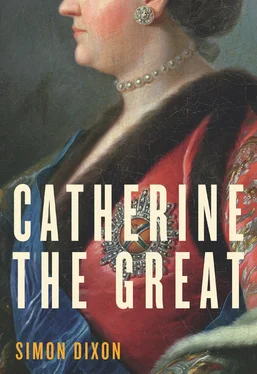Before he learned of Elizabeth’s death, Frederick had begun the New Year nervous of a Russian attack on Berlin and anxious that Europe would self-combust into a general war within six months. 57The accession of a pro-Prussian tsar in St Petersburg offered the unexpected prospect of delivery for his war-torn state. To escape from his ‘moment of great crisis’, the king had been unwilling to oppose Peter’s ambition to recapture Schleswig for Holstein by invading Denmark. ‘There is nothing more pressing for us,’ he had written at the end of January, ‘than to achieve a prompt reconciliation with Russia to pull us back from the edge of the precipice.’ To hinder Peter’s plans was to ‘risk embittering him and spoiling everything right from the start’. 58Paradoxically, it would be the tsar who ultimately suffered most from the apparent encouragement of his Prussian hero. Secure in the knowledge that Frederick would not stand in his way, he launched into rash plans to attack the Danes.
Catherine and her friends had aspirations of their own. Left alone since February, when her husband had been appointed as ambassador to Constantinople after a public altercation with the tsar, Princess Dashkova had had plenty of time to mull over her plans for a revolution. It was in April that she later claimed to have begun to sound out contacts in the capital—and it is possible that she did, since the Austrian ambassador reported her in mid-May as an ‘intriguer who likes to meddle in affairs’. 59The signs could hardly have been more promising. If only ‘the desire of making improvements’ had not made Peter III ‘imprudently hazard premature reformations’, he might have achieved so much more. 60As it was, most of the political capital his government had gained by emancipating the nobility was dissipated by more impetuous measures that undermined the security of the governing elite. By substituting his Holsteiners for Elizabeth’s trusty Life Guards, and forcing haughty courtiers such as Prince Trubetskoy to parade in front of the Winter Palace at eleven o’clock each morning, Peter ruptured his relationship with the highest civil and military officers. By depriving the Senate of its powers of patronage over lesser government offices and formally forbidding it to declare laws in its own name, he launched ‘something in the nature of a constitutional revolution’. And by determining to confiscate the Church’s lands in a series of edicts beginning on 21 March, he had alienated the clergy and left himself open to the charge of being an alien ruler determined to undermine the foundations of Russian culture. 61
Such changes seemed all the more unnerving against a background of financial crisis. Although Russia’s annual deficit, having peaked at 3.6 million roubles in 1748, had been reduced to something nearer 1.25 million by 1755, the Seven Years’ War had put the treasury under intolerable strain. By the autumn of 1760, no further funds could be found to support a campaign that had already cost some 40 million roubles; a year later Russian troops were owed more than 1.5 million in arrears and deserters were causing havoc with arson and theft. In these circumstances, peace with Prussia was not so much an act of homage to Frederick as a financial necessity. 62Peter’s ministers planned imaginatively for financial reform. But since their measures could only be expected to bear fruit in the medium term (as indeed they did, much to Catherine’s subsequent benefit), the short-term options were limited. Since no Russian bid to borrow on the Amsterdam finance markets had yet succeeded, the tsar had more than 2 million roubles minted. 63But once the Senate learned on 23 May that the deficit stood at 1.1 million, Peter’s plan to attack Denmark could hardly be countenanced. A week later, the ten-man council of war, claiming to speak ‘on behalf of the nation’, unanimously recommended him to reconsider. Even advisers who had initially urged him on were now, as the British ambassador reported, ‘throwing pitchforks into the fire to stop the Emperor from going’. 64
It was at this point, according to his own account, that Nikita Panin began to plan for a bloodless coup. As a former ambassador to Stockholm, the idea of attacking Denmark was particularly abhorrent to him, and everything in Peter’s emerging style of government seemed to echo the arbitrary elements of Elizabeth’s reign that Panin, a confirmed constitutionalist, was anxious to supersede. Expert in the art of political bribery as a result of his time in Sweden, he set out to buy support for Catherine. 65Meanwhile, as if to prove that he remained his own worst enemy, Tsar Peter risked further obloquy by publicly humiliating the empress at the second banquet in honour of the peace with Prussia on 9 June. Having placed himself at some distance from his consort in order to sit opposite the Prussian ambassador, he lost his temper when she failed to rise for the toast to the Imperial family (among whom she had in all innocence included herself). Yelling across the table that she was ‘a fool’, Peter reduced Catherine to floods of tears. This incident understandably caused ‘a great sensation in the city’. After it, as Dashkova recalled, ‘sympathy for the empress grew in proportion to contempt for her husband’. 66Barely a week after the coup that soon followed, Sumarokov highlighted the event in his ode on her accession, in which Catherine’s tears were made to symbolise the consternation of the whole Russian nation. 67
By her own subsequent testimony, it was this public humiliation that persuaded Catherine herself to ‘lend an ear’ to the treasonous plots developing all around her. 68When Peter, who had never been blessed with sensitive political antennae, departed for Oranienbaum on 12 June, she was left in St Petersburg for a further five days, in constant touch with Dashkova, Grigory Orlov and Panin. It was then that their conspiracy began to take shape.
* * *
‘If all leaders of conspiracies were to admit how much chance and opportunity had contributed to the success of their various ventures,’ Dashkova later observed, ‘they would have to descend from a very high scaffold.’ 69She, however, showed little sign of modesty in a notoriously self-serving account that attributed all the major initiatives of Catherine’s coup to her own zeal and ingenuity. In fact, she knew nothing of her friend’s relationship with Grigory Orlov. He himself apparently took little part in the plotting, fearful that the tsar was having him watched. His brother, Aleksey, was more active in recruiting forty or so of his fellow Guards officers. Though his allegiances remain uncertain, the chief of police, Baron Korf, may also have been at least a tacit supporter. Having once been a firm ally of the tsar, he began to pay more attention to Catherine in June, and his subordinates did nothing to prevent the coup that they were obviously expecting. 70
Having initially determined to arrest Peter when he returned to St Petersburg to depart for the Danish campaign, the plotters were thrown into action earlier than they had expected when careless talk led to the arrest of one of their supporters, Captain Passek. At dawn on the morning of 28 June, Aleksey Orlov woke Catherine at Peterhof, where Peter was expected later that day to prepare for his name day celebrations. According to her own account, they drove at speed towards St Petersburg. Met by Grigory along the way, they made straight for the barracks of the Izmailovsky Guards where Catherine was immediately proclaimed empress and sovereign of all the Russias. From there, Kirill Razumovsky took her to the Semënovsky Regiment’s barracks where they were joined by the Preobrazhensky Guards. The Horse Guards soon followed as Catherine made her way to the Kazan Church where she was again proclaimed sovereign by the clergy. It was barely ten in the morning when she reached the Winter Palace, where Paul, brought from the Summer Palace in his nightclothes by Nikita Panin, was displayed from a balcony to the cheering crowds while Archbishop Dimitry (Sechënov) circulated among the soldiers to administer the oath of loyalty.
Читать дальше












